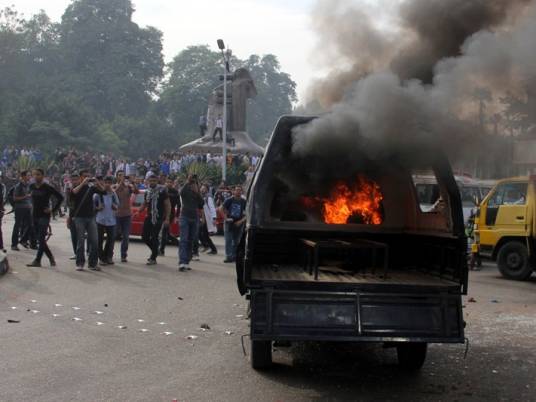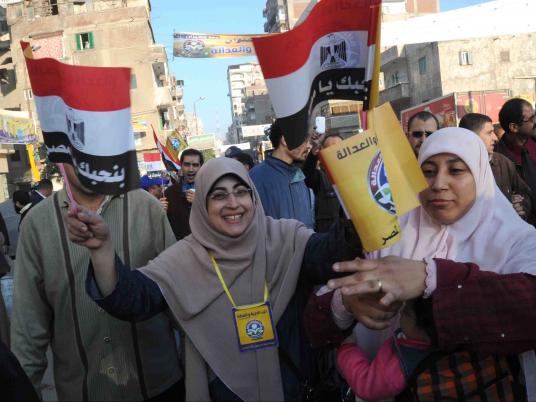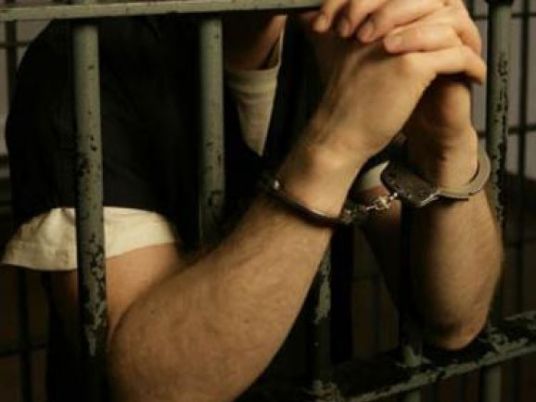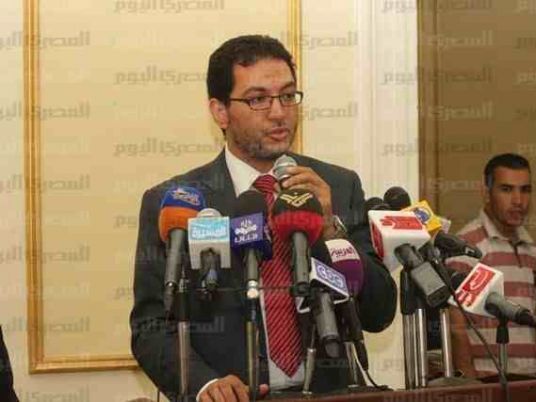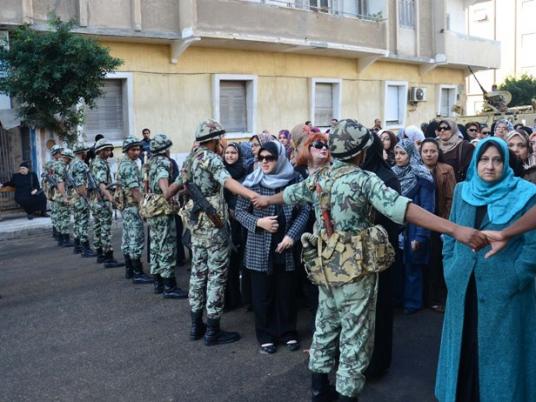
Egypt’s first post-Hosni Mubarak parliamentary race kicked off this week amid jubilation over the high turnout and the relative smoothness of the process as well as fears that the generals might exploit the successful process to enhance their position.
In a queue measuring at least two kilometers, Maha al-Gemei flipped between reading the papers and discussing politics with fellow voters who all waited patiently for their turns outside a polling station in the upper-middle-class neighborhood.
“I am happy. The country has been given back to us. We want to shape it and we want our voices to be heard,” said the 48-year-old communications engineer, who covered her head with a blue-and-white chiffon checkered scarf tied into a knot on the back of her head.
“Elections are the first step to putting our country on the right track,” she added. “For the last ten months, we had no idea where we were headed.”
Army officers and soldiers manned the police station, constantly smiling at voters and bringing benches for the elderly to rest.
On Monday, the first phase of voting for the People’s Assembly — the parliament’s lower house — began with more than 18,000 polling centers opening their doors to eligible voters in nine out of the nation’s 27 governorates. In this phase, candidates are competing over 112 seats that are up for grabs to party lists and 56 seats allocated to single winners.
At press time, the official turnout and the first round results were not yet announced, but the long queues attested to high participation that surpassed by far the significantly low turnout in previous elections. Under Mubarak, the turnout hovered around 20 percent as Egyptians remained aloof from polls whose results were always a foregone conclusion.
Like most voters, Gemei voted for the first time in her life in the March referendum that the military held to ascertain the majority’s view on the transition process.
Some irregularities were reported in the current elections, including violation of the ban on campaigning on the polling day. The Muslim Brotherhood’s Freedom and Justice Party (FJP) was the most visible challenger to this rule. Its campaigners distributed party leaflets outside polling stations in several provinces.
Non-Islamist parties, particularly the Egyptian Bloc and the Reform and Development Party, were also implicated in similar violations. They sent text messages to voters calling upon them to vote for their candidates. In Port Said, both the FJP and the liberal Wafd sent cars with megaphones to tour the city for the same purpose.
According to Tarek Zaghloul, a representative of the Egyptian Organization for Human Rights, a local NGO that monitors the polls along with another 122 groups, electoral bribes were also recorded.
Yet, the vote remains incomparable to notoriously fraudulent elections held under Mubarak, he contended.
“We thought a lot of blood would be shed in these elections given the current security conditions. Yet, we have not seen the same violence we witnessed in the past,” he said.
Parliamentary elections come on the heels of bloody clashes that erupted on 18 November between protesters and police forces in downtown Cairo. For five consecutive days, Central Security Forces deployed tear gas and fired birdshots and live ammunition at protesters who responded by throwing stones and Molotov cocktails on Mohamed Mahmoud Street, off of Tahrir Square, the epicenter of the 25 January revolution. At least 42 people were killed in these clashes.
Outraged by police brutality and military passivity, tens of thousands took to the square in what observers dubbed as the second wave of Egyptian revolution, demanding an immediate handover of power from the SCAF to civilians. As voters were flocking to polling stations on Monday and Tuesday, protesters were still camping in the square, promising to stand their ground until the generals heed their demands.
“The more the military implements the revolution’s demands, the more faith people will have in it,” said Mohamed Hamed, a leader of the liberal Free Egyptians party.
“[This week], the military showed that it really wants to instate civilian rule in the country,” added the parliamentary hopeful, in reference to the success of the first phase of elections.
In recent months, the SCAF has faced harsh criticism for its failure to realize the demands of the revolution and its inclination to monopolize politics during the transitional period. Also, there have been doubts over whether the generals had any intention to relinquish power to civilians.
But after the polls, some observers think the SCAF might capitalize on the possible success of the parliamentary elections and interpret the high turnout as a popular endorsement of the military-set roadmap for transition, and hence seek to enhance its political position in the new order.
“At the end, they will say see we were right and this [election] carried a referendum on our good planning and thinking,” said Emad Shahin, an Egyptian political science professor at the University of Notre Dame.
“But this is not true. It [the election] should not be exploited by anyone to give credit to a specific institution…Election is an entitlement, it is an overdue entitlement,” he added.
Since Mubarak’s fall in February, SCAF members sought to send assurances that they had no intention to stay in power and that Mubarak would be the last general to be at the helm of the state. Yet, they strove to secure their privileged position within the political system.
Shortly before the elections, they put a document up to public debate that contained a set of constitutional principles denying the elected parliament the right to oversee military affairs or budget. In the meantime, they released another document that would give the SCAF wide authority over the constituent assembly that is expected to draft the constitution.
“We are not risking a military coup or a military rule. What we are risking is the final terms of their [the generals] safe exit from politics,” said Amr Shalakany, Associate Professor of Law with the American University in Cairo.
For Shalakany, the military is keen on securing the elections to further its own interests. It wants a parliament it can “pressure” to pass constitutional articles that will protect its position, argued Shalakany.
Last week, Mamdouh Shahin, Assistant Defense Minister for Legal Affairs and a SCAF member, said that the new parliament will have no authority to cast a no-confidence vote in the government. The statement was seen as an indicator that the SCAF seeks to weaken the next parliament.
If the generals succeed in capitalizing on the success of the poll to leverage the public image, the revolution will be at risk, according to Shalakany.
“In the most sinister scenario possible, this can be the beginning of crushing the revolution completely. It is a beginning of a transition to a Russian model,” he said.
Yet, for Shahin, the generals might not have it that easy.
“I do not think it will be acceptable at the popular level that a certain institution will maintain a sovereign status over elected institutions,” said Shahin.

